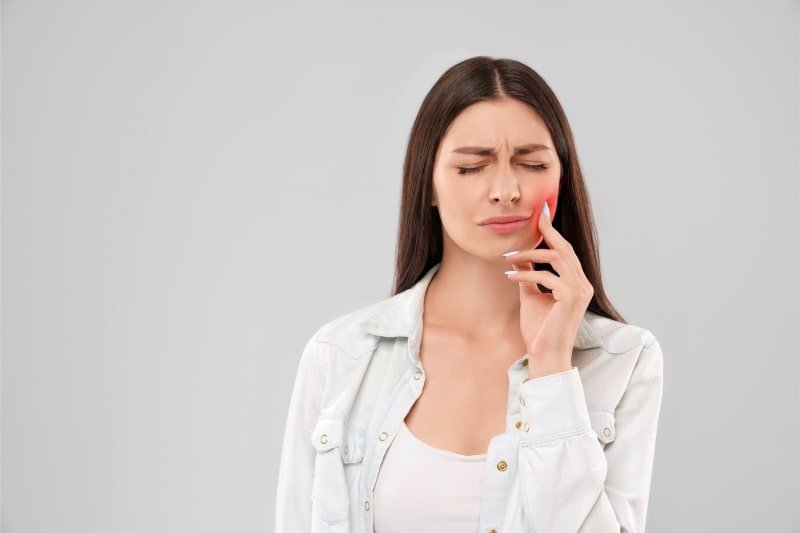Menu
Free Consultation

Tooth clenching, in other words, bruxism, is a condition that occurs during sleep or while awake and usually occurs due to stress. Tooth tightening, which can be seen in every person, is extremely harmful from the point of view of dental health.
Bruxism, also known as tooth clenching or teeth grinding, is characterized by a person clenching, grinding, or rubbing their teeth together. People with bruxism problems may also experience problems such as clenching or grinding their teeth while awake.
People who clench or grind their teeth during sleep have a risk of developing sleep disorders such as snoring and pausing breathing, in other words, sleep apnea. Although mild cases of bruxism can improve without the need for any treatment, some people may experience severe cases of bruxism, which can cause jaw disorders, headaches, damage to teeth and many other problems.
It is usually not possible for a person to realize that he has a bruxism problem until some symptoms appear. Therefore, it is important to know the signs of bruxism and not to neglect dental care.
Although there is no known exact cause of tooth clenching or grinding, it is possible to mention some of the findings that cause tooth clenching. The most common causes of tooth clenching can be listed as follows:
Tooth tightening while sleeping or awake is a problem that can be seen in any age group. However, tooth clenching during sleep is more common in children and teenagers. The nocturnal tooth tightening condition seen in the early period mostly ends during adulthood or with the emergence of permanent teeth.

It is important for people who have tooth tightening and grinding problems to contact a dentist and act in accordance with his recommendations. The treatment plan to be applied is determined on a patient-specific basis according to the damage to the teeth. The treatments to be applied for the purpose of tooth tightening treatment can be listed as follows:
Tooth tightening is a problem that can be seen with different symptoms in each age group. It is possible to list the symptoms that are often seen in people who have involuntary tooth tightening problems as follows:
The tooth clenching problem that occurs during a person's sleep is called “sleep bruxism”, and the tooth clenching problem that occurs when a person is awake is called “awake bruxism”.
The diagnosis of tooth tightening can be made by a comprehensive physical examination performed by a dentist. At this stage, the appearance of worn tooth enamel, enlarged jaw muscles, broken and chipped teeth in the patient may be the elements that guide the diagnosis. Nov. On the other hand, the cause of the abrasions observed on the teeth may also be the corrosive substances in the toothpastes, excessive and uncontrolled brushing of the teeth, acidic, alcoholic beverages and sweeteners. In order for the distinction to be made and the diagnosis to be made correctly, it is necessary to contact specialist and experienced dentists.
There are different methods that can be applied for the purpose of tooth tightening treatment. Which method will be applied is determined on a patient-specific basis after determining the underlying cause of the problem.
Using plaque at night during sleep is one of the most commonly used methods to treat tooth tightening problems. When night plaque is used, grinding of teeth and damage to teeth can be prevented during the night. Night plaques are produced according to the measurements taken from each patient. Transparent and personalized night plaques are usually worn by patients with tooth clenching and grinding problems before going to sleep. Thus, the risk of deformation of the jaw joint can be minimized over time. Another feature of transparent dental plaques is that it is an effective method to solve extremely severe tooth clenching and grinding problems that can cause fractures in the teeth and fillings. However, night plaque is a protective method and it is not possible for it to definitively eliminate bruxism disease.
When bruxism is caused by stress, the first step is to eliminate the factors that cause stress. It may be necessary to get psychological support for this. In addition, various activities such as listening to music, walking, reading books, and meditation can help reduce stress levels.
When people with bruxism problems close their mouth, the need for crowns, fillings or orthodontic treatment may arise in cases where the lower and upper teeth do not fit exactly on top of each other. In order for the closure to occur normally, patient-specific treatment should be planned.
After the patient-specific evaluations, the dental botox procedure can be performed if the dentist deems it necessary. The function of the muscle in the area where Botox is injected is temporarily reduced and muscle relaxation is provided. Nov.1, Nov. Which dose of medication will be injected during dental botox treatment and which area will be injected may vary depending on the gender, anatomical structure, November, muscle mass, skin thickness of the patient and the degree of bruxism.
Correctly identifying the underlying cause can ensure that the correct treatment is applied and the problem of tooth tightening is eliminated. If the correct treatment is applied and regular checks are made, the problem of tooth tightening is usually completely and permanently eliminated. Since the tooth tightening problem is of psychological origin in most patients, follow-up should not be stopped even in cases where it is considered to have completely disappeared.

Some measures that can be taken to prevent tooth tightening problem are listed below:
In addition, in patients where the tooth tightening problem develops due to various medical conditions, such as epilepsy, reflux, or sleep apnea, it is necessary to treat the underlying disease of the tooth tightening problem or plan a treatment to alleviate the symptoms. Oct. Since the tooth tightening problem usually causes similar symptoms to other oral and dental health diseases, taking due care not to disrupt routine dental examinations can provide an advantage in terms of early diagnosis and treatment of the problem. In this way, it may be possible to improve the patient's quality of life.
Bruxism treatment in Turkey offers a range of practical solutions tailored to each patient’s unique needs. Clinics nationwide provide thorough assessments to uncover the root causes of teeth grinding, ranging from stress and anxiety to jaw misalignment.
A commonly recommended solution is the use of “custom night guards”. These dental devices act as a protective barrier between the upper and lower teeth, reducing wear and tear while promoting relaxation during sleep. They are customized for individual comfort and precision fit.
“Neuromuscular dentistry” is another advanced approach to balance. By correcting the alignment, this treatment helps to relieve muscle tension and reduce the pain commonly associated with bruxism.
For some patients, Botox injections offer relief by targeting the specific facial muscles responsible for grinding. This non-invasive treatment has gained popularity for its ability to alleviate symptoms without requiring more intensive procedures.
With these diverse treatment options available, individuals suffering from bruxism can find effective relief within Turkey’s well-established healthcare system.
MosDent Dental Hospital stands out as a leading destination for bruxism treatment in Turkey, offering expert care for patients dealing with teeth grinding. The hospital boasts a team of highly skilled professionals who address the complex issues associated with bruxism.
One of MosDent’s key advantages is its state-of-the-art facilities. Equipped with the latest technology, they ensure precise diagnoses and create personalized treatment plans catering to each patient’s needs.
Patient comfort is a priority at MosDent. The hospital provides a welcoming and calming environment from the moment you arrive, ensuring your experience is as stress-free as possible.
Additionally, MosDent’s competitive pricing makes it an attractive option for local and international patients seeking high-quality care at affordable rates. The combination of advanced technology, patient-centric care, and affordability makes MosDent an ideal choice for anyone seeking relief from bruxism.
Your journey to overcoming teeth grinding starts at MosDent, where excellence and patient satisfaction are the top priorities.
